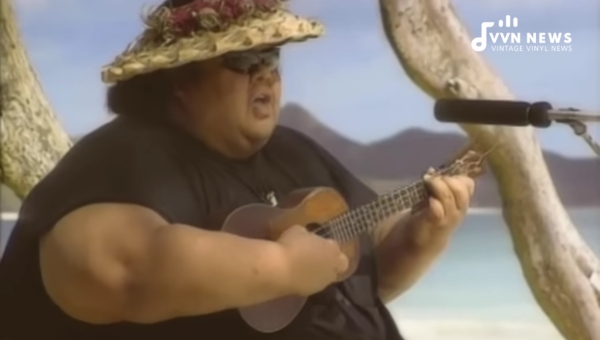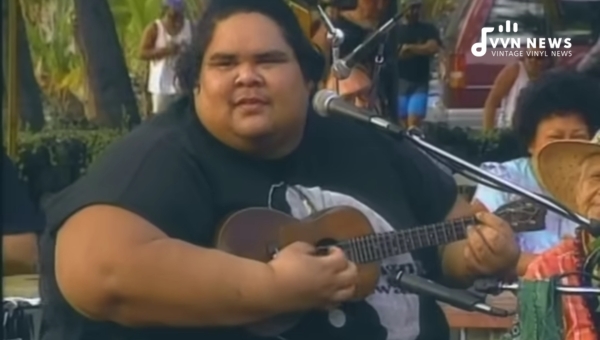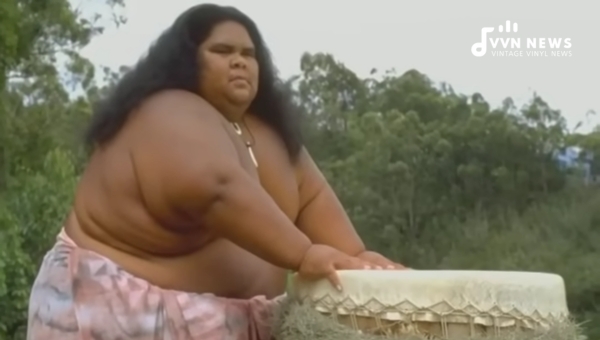The gentle strum of a ukulele, underpinned by the soulful resonance of a man with a larger-than-life persona and voice to match, paints the iconic image of Israel Kamakawiwo’ole, an embodiment of the enticing allure that is the music of Hawaii.
He was more than just an entertainer; he was, in essence, the melodious heartbeat which brought global recognition to Hawaii’s music scene.
When anyone hears “Israel Kamakawiwo’ole & The Music Of Hawaii,” they immediately think about his beautifully haunting rendition of ‘Over the Rainbow.’
But delve deeper into his discography, and you find yourself on a musical journey imprinted with authentic Hawaiian tradition and modern influences.
Each strum tells a story, each lyric bears an essence of the enchanting Pacific islands he called home, painting vivid images through sonorous tunes that continue to touch hearts around the world.
Who was Israel Kamakawiwo’ole?
Israel Ka’ano’i Kamakawiwo’ole, affectionately known as Iz or Bruddah Iz, was born on May 20, 1959, in Honolulu, Hawaii.
Known for his kind heart and infectious smile, Iz forged an extraordinary career that took the music of Hawaii to new heights on a global scale.
Overview of Israel Kamakawiwo’ole
Iz was the gentle giant of Hawaiian music. Standing at 6’2″ and weighing over 700 pounds, his physical stature was as large as his personality and talent.
His commanding presence was counterbalanced by his soft-spoken demeanor and tender melodic voice. Through music, he expressed his love for Hawaii and its people.
He began playing music at the age of six. By the mid-’80s, along with his older brother Skippy, they formed a band called “Makaha Sons of Ni’ihau”.
The group became popular throughout Hawaii for their traditional Hawaiian music blended with reggae influences.
The death of Skippy in 1982 acted only as a brief setback to Iz’s journey but definitely marked a stinging personal pain.
A unique fusion of traditional Hawaiian music
Iz’s solo career is where he truly brought the unique fusion of traditional Hawaiian music to life. His first solo album came in 1990 with ‘Ka ‘Ano’i.’
But it was not until the release of ‘Facing Future’ in 1993 that Iz’s hauntingly beautiful rendition of ‘Over the Rainbow’ would catapult him into international fame.
The song demonstrates how he deftly fuses traditions with modern influences, combining lyrics from The Wizard Of Oz classic with another old favorite – ‘What a Wonderful World.’
This track encapsulates all that Kamakawiwoʻole represented: happiness amidst the struggle, beauty amidst the chaos, presenting listeners with a bittersweet collage painted through poignant vocals laid over the soothing strumming of the ukulele.
In a touching tribute after his demise in 1997 due to health-related issues stemming from obesity, the state flag flew at half-mast.
In the years that followed, Kamakawiwoʻole posthumously received awards recognizing his contributions to Hawaiian music.
His voice continues to strike collective heartstrings around the world – an echo remaining from days when this gentle giant walked among us strumming stories on strings.
Israel Kamakawiwo’ole personified the Hawaiian spirit – spreading joy through melodies washed with hope and underlaid by raw emotion, creating perfect harmony between past & present – igniting renewed interest in island sounds even decades past him signing off with Aloha, meaning both goodbye & love.
Early Life and Influences

Born on the picturesque island of Oahu in 1959, Israel “Iz” Kamakawiwo’ole was a native Hawaiian who cherished his culture and birthplace.
Raised in Waianae, a place renowned for its strong Hawaiian identity, Iz’s upbringing was interwoven with the rhythmic pulse and poetic lyricism of traditional Hawaiian music.
His parents infused their love for Hawaii’s distinct melodies and harmonies into their child from a very young age, paving the way for the monumental artist Iz was destined to be.
Upbringing in Hawaii
Life wasn’t easy growing up. Iz experienced firsthand the struggles of marginalized communities.
Hawaii at that time grappled with issues of poverty, homelessness, and substance abuse.
These experiences would later shape his music’s themes — powerful messages urging unity, compassion, cultural preservation, and social justice.
A big part of Hawaiianhood is music, it flows like an unseen river between the islands, constellating them together beyond geography.
And this affection ran particularly deep in Iz’s family who had an ardent passion for music. Iz himself learned to play ukulele at a tender age under his mother’s careful tutelage.
Influence of Hawaiian Legends
Like many young children growing up on sandy shores here lived legends too – ones written in song rather than text – stories passed down through generations by revered musicians such as Gabby Pahinui and Eddie Kamae.
These Hawaiian legends greatly influenced Kamakawiwo’ole’s musical stylings as he grew older.
Pahinui and Kamae were pivotal figures pioneering in preserving traditional Hawaiian music when it faced risk from rapidly modernizing influences creeping onto the islands.
Their resolute efforts served as a beacon guiding Iz’s own musical journey bearing testimony to this rich lineage of sound while fostering innovation that spoke to their contemporary moment.”
This unique blend of tradition and contemporaneity would become emblematic of Israel Kamakawiwo’ole as an artist rooted firmly in his Hawaiian ancestry while resonating with global audiences through universally appealing thematic narratives.
Every chord Kamakawiwo’ole strummed echoed with centuries-old Aloha tradition beautifully intertwined with a fresh narrative resonant for a modern world, thus encapsulating Hawaii’s essence and imparting it to listeners worldwide.
Also Read: Who Was The Fifth Beatle? [George, Ringo, John & Paul]
Makaha Sons of Ni’ihau
Israel Kamakawiwo’ole, often fondly known as ‘Iz,’ began his musical journey in the mid-1970s with a local band – Makaha Sons of Ni’ihau.
Iz’s role in the band was vital, not just as a lead singer or musician, but as an emotional cornerstone whose unabridged passion for music shone through every performance.
Formation and Members
The band was originally formed by Iz, his brother Skippy, along with Louis “Moon” Kauakahi, Sam Gray and Jerome Koko.
The group’s lineup would later evolve, but, without a doubt, it was their collective musical synergy that catapulted them to local fame.
Musical Contributions
Makaha Sons of Ni’ihau’s contribution to Hawaiian Music was colossal. Their distinctive musical style breathed life into traditional Hawaiian tunes and re-introduced age-old melodies to younger generations.
They were instrumental in leading the Hawaii Renaissance in the 1970s and 80s – a period marked by a profound resurgence of interest in preserving Hawaii’s historic culture and music.
Their albums like Kahea O Keale, Keala, and Puana Hou Me Ke Aloha won numerous awards, cementing their place as pillars of Hawaiian Music.
These accolades also shone light on Iz’s enchanting vocal skills, which later made him an international sensation during his solo career.
In hindsight, without the influence of Makaha Sons of Ni’ihau & Iz’s integral role in it, the landscape of Hawaiian Music wouldn’t have reached its acclaimed status today.
This they achieved through unwavering dedication towards creating music soaked in authenticity while resonating with listeners worldwide.
Solo Career and “Facing Future”

In 1993, Kamakawiwo’ole embarked on a bold new journey and took a critical step in his life – he went solo.
His decision came bearing immense fruits as it was during this time that he released his most lauded album, “Facing Future.”
Facing Future
The “Facing Future” album was more than just an amalgamation of songs it carried the aloha spirit that Iz so often invoked through his music.
The album blends traditional Hawaiian sounds with jazz and reggae influences, painting an enchanting soundscape synonymous to Hawaii’s vibrant culture.
The standout track from the album that put Iz on the global music charts is none other than his rendition of Judy Garland’s “Over the Rainbow”.
Using just a ukulele for accompaniment, Iz skillfully reimagined this classic. His soulful voice would breathe a new life into the number, making it synonymous with himself and etching his mark on global music spheres.
Impact Of “Over The Rainbow”
Kamakawiwo’ole’s “Over The Rainbow” singlehandedly skyrocketed him to international fame.
Far from being just another cover version, it became a haunting anthem that continues to touch hearts worldwide.
Hugely popular even today, it has accrued over 1 billion streams globally across major platforms, proof of its timeless appeal.
One cannot mention Israel Kamakawiwo’ole without acknowledging the transformative power of this single track.
As an artist and ambassador of Hawaii’s vibrant culture, Iz undoubtedly had much more to offer beyond these rainbows.
Cultural Impact and Legacy
Encompassing more than unforgettable melodies, Israel Kamakawiwo’ole’s career and music represented a celebration and preservation of Hawaiian culture.
His distinctive approach to music shone the spotlight on Hawaii, taking its unique rhythms and messages far beyond its volcanic shores.
Iz’s Preservation of Hawaiian Culture
One listen to Israel ‘Iz’ Kamakawiwo’ole ‘s discography reveals much about his boundless passion for his ancestral land.
His songs were not just soulful renditions but also heartfelt narratives woven with Hawaiian folklore, traditions, and values.
He was a compelling storyteller who used the texture of his voice and haunting melodies to pass on the rich cultural tapestry of his beloved islands.
Spread of Hawaiian Music Internationally
Fuelled by his deep connection with his heritage, Iz’s music pierced international borders.
It became a path through which people across the globe could experience Hawaii’s enchanting spirit.
He transformed local Hawaiian tunes into global anthems, warmly welcoming everyone into the harmonious world that is Hawaiian Music.
By echoing tradition in every note, Iz elevated Hawaiian music to an international stage, stirring millions with poignant melodies that continue to resonate even after their creator’s voice has fallen silent.
Also Read: Best Violinists Of All Time [The Maestros Who Made History]
Health Issues and Passing

Throughout his life, Israel Kamakawiwo’ole, affectionately known as ‘Iz’ to his fans, grappled with numerous health concerns.
His larger-than-life frame was often a cause for concern, increasingly so as he embarked on a successful solo career that required high-energy performances.
A continual battle with obesity has led to several respiratory and heart issues. This combination of medical problems gradually began to take its toll on Iz’s energetic spirit.
Health Challenges Faced by Iz
The repercussions of Iz’s health battles were visible. Even as he carved a significant niche for himself in the world of music in the 1990s, hospitalizations became frequent.
Yet his spirit remained unshaken something evident in the happiness emanating from his performances.
Impact of His Passing on the Hawaiian Community
On June 26, 1997, at the young age of 38, ‘Iz’ breathed his last; it felt like an abrupt silence fell over Hawaii’s music landscape.
Hundreds flocked to the state capitol upon hearing their beloved Bruddah Iz had departed, some clad in traditional Hawaiian attire, others holding flowers and ukuleles—a testament to his profound impact on the wider community.
Iz’s loss sent ripples beyond just musical boundaries, it was a cultural loss for Hawaii.
His music is credited for rejuvenating interest in traditional Hawaiian sounds, contributing significantly to ‘Hawaiian’ culture—a revival movement preserving Hawaiian traditions against increasing globalization effects.
The soothingly hopeful tone that resonates throughout much of Iz’s work continues to offer solace and strength to many who seek it.
Continued Influence and Tributes
Hawaiian music, with its poignant rhythm and soothing cadence, courtesy of Kamakawiwo’ole’s influential contributions, continues to reverberate around the world.
Ongoing Influence of Iz’s Music
Israel “Iz” Kamakawiwo’ole’s deep, emotionally charged voice transformed the global perception of Hawaiian music.
His timeless melodies still serenade listeners, influencing not only the music industry but also contributing to the cultural fabric of Hawaii itself.
A true testament to this is the persistent popularity of his rendition of “Over the Rainbow”.
This track remains evergreen – gracing countless film soundtracks and commercial placements, thus continually introducing new audiences to Hawaiian music.
Iz’s influence extends beyond his melodies; it lies in his unwavering representation of Hawaiian culture.
In every song he sang, in each note he played on his ukulele, Israel painted a vibrant picture of his homeland. This image continues to inspire a fusion of traditional Hawaiian sounds with contemporary music genres.
Tributes by Contemporary Artists
Indeed, the legacy Kamakawiwo’ole left behind carries into our contemporary times.
As evidence is heart-warming tributes paid by various artists all over the globe who revere him as an icon in their musical journeys.
Many musicians have covered his songs as a sign of respect for their mentor in melody.
A notable example is Jack Johnson, who often includes Iz’s iconic songs during his live performances.
He binds audiences under a collective adoration for this unforgettable artist and, through it revitalizes Hawaii’s indigenous musical culture.
In conclusion, Israel Kamakawiwo’ole lives on – resounding in every strum of a ukulele or lilting tune carrying the inkling of island flavor.
Though he left us too early in 1997, every note he sang perpetuates an enduring legacy etched deeply within the realm of Hawaiian music and beyond.
Also Read: 15 Best Flute Players In The World [Who Made The List?]
FAQ About Israel Kamakawiwo’ole
Who was Israel Kamakawiwo’ole?
Israel Kamakawiwo’ole, also known as “IZ,” was a renowned Hawaiian musician and cultural icon famed for his ukulele rendition of ‘Over The Rainbow.’
What style of music did Israel Kamakawiwo’ole play?
IZ predominantly played a blend of jazz and reggae, infused with traditional Hawaiian folk music.
What band did Israel Kamakawiwo’ole play in before his solo career?
Before embarking on his solo career, Iz was part of the popular Hawaiian band Makaha Sons of Ni’ihau.
How did Israel Kamakawiwo’ole impact Hawaiian culture?
IZ had a profound influence on preserving and promoting Hawaiian culture globally through his music and public advocacy work.
How is Israel Kamakawiwo’ole remembered today?
Today, IZ is remembered as a musical legend, with several tributes and posthumous honours being dedicated to him. His most prominent tribute includes a bronze statue at the Waianae Neighborhood Community Center in Honolulu.
Conclusion
Israel Kamakawiwo’ole was a beloved Hawaiian musician who made an indelible mark on the world’s music scene.
His unique fusion of traditional Hawaiian sounds with modern influences breathed new life into the genre.
Even today, his music serves as a beacon, shining light on the richness of Hawaii’s cultural heritage.
Kamakawiwo’ole’s legacy is not just contained to ‘aloha’ and ‘mahalo’ but cultivates a deep appreciation for the pristine beauty that is Hawaii.
His voice continues to echo across the globe, symbolizing the enduring spirit of Hawaiian music.








